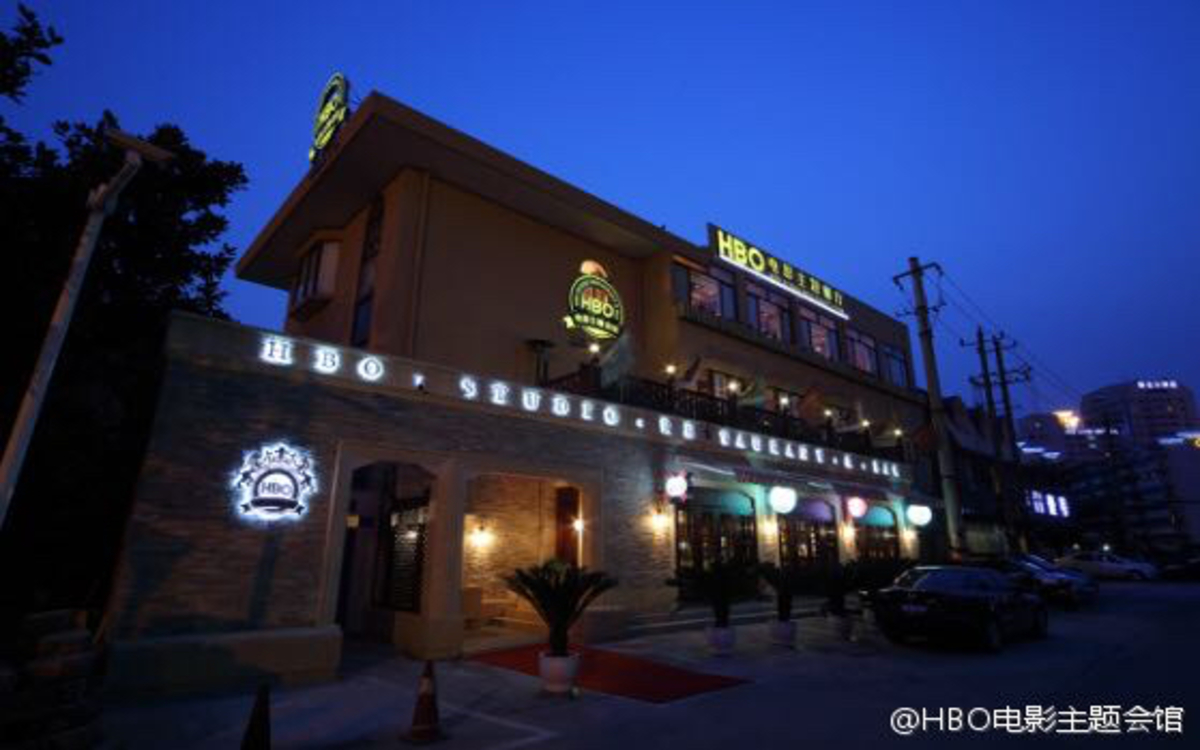The American cable giant finds itself locking horns with a local restaurant in a classic China IPR dispute.

If the red and white striped awnings and the vine-covered façade of the vaguely Tuscan-style, three-story building in the middle of Jiangsu province’s Wuxi don’t scream “foreign” to locals, the name of the establishment, displayed on at least five different signs, certainly would.
The “HBO Studio Restaurant & Bar,” a sort of facsimile of a Hollywood eatery, has been serving up hot dogs and “Hepburn Garden Salads” (126 calories) to locals in the city of about 6 million for the past five years, but has now attracted more unwelcome attention from a powerful and potentially litigious American media company.
HBO, the U.S. cable and satellite television network, has threatened legal action against the restaurant for infringing its trademark, a brand that denotes sophisticated yet potentially risqué premium televisual content in the United States, but is seemingly up for grabs 7,360 miles away from New York headquarters in southern China.
On Saturday, the restaurant posted legal documents on its official Sina Weibo account that seemed to show that the establishment registered its trademark on July 4, 2012, before the U.S. company’s registration in China. Co-owner of the restaurant Zhang Jian said there was no direct conflict between the two businesses as one is in the catering, while the other is in film and TV, speaking to local media.
But locals would be forgiven for thinking that the establishment has some sort of connection with the media company given that it doesn’t provide any clue as to what the letters that make up its acronym represent other than “home,” “box,” and “office.” The Chinese caption on the restaurant’s coat-of-arms logo makes the connection closer still, calling itself a “Movie-themed Club.”
TV and movie-themed restaurants are nothing new in China. Friends’ Cafe, a cheap replica of the Central Park cafe that appeared in the US TV sitcom of the same name, has been operating in Beijing since 2010, and not far away in the nation’s capital, the iQiyi Cafe, owned by iQiyi.com, a Chinese online movie and TV portal, serves up Korean-style fried chicken and beer for customers to gobble down while they watch their favorite South Korean dramas.
For foreign companies trying to build a brand in China, fending off local companies trying to piggyback on your already inbuilt glamor, mystique or exoticism is an all-too-common cost of doing business in a country that traditionally has played fast and loose with intellectual property rules.
But there have been recent signs of a significant shift underway with American basketball legend Michael Jordan scoring a rare victory in his legal battle with a Chinese sportswear company over the use of his name last year, a notable example. And in January, the country’s Supreme People’s Court ruled that the names of public figures should not be used on trademarks.
Clarifying an already established law, the court stipulated in a press conference in Beijing that names of “public figures in fields such as politics, economics, culture, religion and ethnic affairs” should not be used on trademarks.
LA-based entertainment lawyer Jesse Weiner calls the legal interpretation from the country’s highest legal court a “significant change to the current regime,” and said it likely also covers well-known fictional names such as “Harry Potter,” “Kungfu Panda,” and “007,” from potential IP squatters trying to find a fast way to name recognition.
The court’s statement coincides with the recent ascendancy of Donald Trump to the US presidency. The colorful real-estate mogul and television personality turned leader of the free world has at least forty-five pending trademark applications in China under his own name. With a clearer law, the newly minted president would have one less worry when it comes to China, a country he assailed during the campaign, and rattled even as President-elect.
For HBO, protecting its brand name, even from relatively small restaurants in far-away Jiangsu province, is important if it hopes to make significant inroads into China’s highly competitive media market. To that end, the company signed a content licensing deal with Internet giant Tencent to deliver shows like Westworld, Game of Thrones, and True Detective to subscribers over the internet and directly into set-top boxes and digital TVs.
More recently the company teamed up with China Movie Channel, a division of state broadcaster China Central Television to make two Chinese-language kungfu movies, Master of the Drunken Fist: Beggar So, and Master of the Shadowless Kick: Wong Kei-ying.
No doubt the company is keen to establish itself as a trusted purveyor of quality entertainment — just not of the culinary kind.





